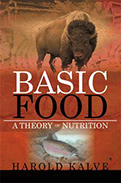
 |
Kalve introduces his theory of nutrition with a question: Why has the problem of weight gain become so acute in the last 60 years? His definition of hunger at two level—physical and non-cognitive—provides the key. Our stomachs may bee full of altered food products, while our body starves for nutrients. So begins Kalve's search for natural foods. He indicts farmers, who increase profits by fattening cattle and chickens with maize instead of normal diets. The farm soil is sprayed with chemical fertilizers for increased yield. We now have fatter animals for slaughter, plumper veggies and bigger berries, which also correspond to larger, human waistlines.
Some of the fault is ours for refusing timeless wisdom. Do we chew food slowly, or blame weight gain on fattening up for winter? Can't we recognize that healthy, disease resistant plants do best under conditions that both challenge and control growth? One hundred pound cabbages are for the fair, not for store shelves.
The second premise of Basic Food is that the origin of mankind dictates what is natural to eat. Based on Kalve growing up in Norway and his belief in evolution, mankind was first a hunter/gatherer existing on proteins and berries. Only millions of years later did we cultivate large quantities of grain (carbohydrates) or cook food.
Perhaps you are among those who believe that the man and woman in Eden first ate fruit, and only later was meat and agriculture introduced. Each theory of mankind's origin agrees about consumption of more natural, early known foods. Unfortunately for the public, government recommendations match neither theory.
More informative chapter headings or an index would improve the book's usefulness in sharing the author's important message. Still, Basic Food is a warning to change our diets… unless we too wish to be "fattened up for the market."